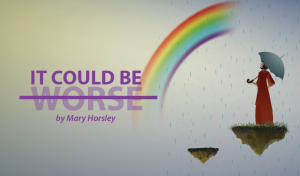
Editor’s note: This is the second article in the “Crohn’s Complications” series by Mary Horsley. This series will focus on IBD-related complications beyond the symptoms. Read the first part of the series here.
In my latest series, “Crohn’s Complications,” I will write about the complications beyond the symptoms and focus on the more extreme medical emergencies that Crohn’s disease and ulcerative colitis can induce. As mentioned in my “Beyond the Bathroom” series, and as many IBD patients can tell you, Crohn’s disease and ulcerative colitis are much more than just bathroom illnesses. Remember, each patient is unique in terms of symptoms and disease, and what may happen for others may not necessarily be your path, too.
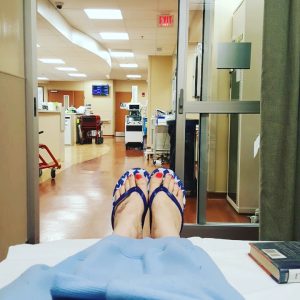
Complications can happen with Crohn’s either through symptoms, sickness, or surgeries, with no two patients suffering exactly the same way. With Crohn’s disease and ulcerative colitis, knowing when to go to the emergency room can be a struggle in itself, on top of the pains and problems you are already fighting through to begin with.
For some, going to the ER is not an option. Some patients refuse to go until they are forced or until they cannot take any more pain. The doctors, the nurses, the tests, the judgment, the endless questions, the confusion, and the dreaded answer that “nothing is wrong” after hours of waiting… For some, the tests and blood work showing nothing “wrong” happens by pure chance. For others, it takes numerous visits to the emergency room for something to be figured out.
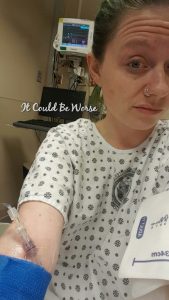
Sometimes, even when the lab work or doctors find nothing, I still know my body better than they do. If I feel bad, if I notice something, I persist until someone, anyone, listens to me. Sometimes, tests are not as black and white or as right or wrong as they would appear.
For me, I know going to the ER can be challenging. I went to the emergency room week after week for quite some time. My lab work and tests never showed anything “wrong,” but I knew something was off. I vomited for months. I bled for longer. I hurt all over and yet I was “healthy” according to my tests. It wasn’t until I persisted and had more testing done that inflammation of my small bowel was discovered. I had CT scans and barium cocktails, and EKG scans when my chest pains started. More than one emergency room doctor pretty much blew me off because the lab work showed nothing significant. Nada, zip.
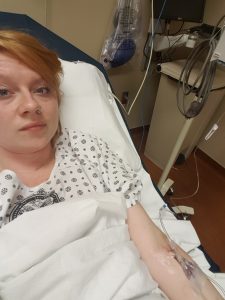
Are you bleeding? You could be anemic. Losing fluids, vomiting, body chills, and pain? You could be dehydrated with inflammation in your bowels. Stomach swollen or distended? You could have a partial or full obstruction. Suddenly extremely ill and faint, sweaty, lethargic? Sepsis or infection can occur and it can be deadly.
You cannot truly know until you see your physicians, and even then you may not find out. But you can at least rule out a few things that can occur with your Crohn’s disease, especially some of the other complications that I will discuss later, such as ostomies or obstruction surgeries.
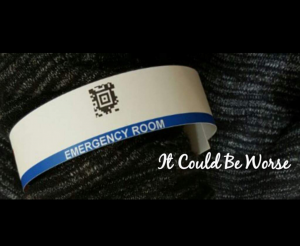
So, when should you go to the ER? In my opinion, anytime you feel it is necessary you should make the trip. If you question whether or not you should go, I would say go. I cannot give medical advice, as much as I’d like to, but if you are like me, then you know your body and you know when something isn’t how it should be. I would much rather be safe than sorry with my Crohn’s disease. If something is not feeling right, then how I am I to know that something isn’t wrong or going awry without seeing someone? Because for me, I know It Could Be Worse.
Note: IBD News Today is strictly a news and information website about the disease. It does not provide medical advice, diagnosis, or treatment. This content is not intended to be a substitute for professional medical advice, diagnosis, or treatment. Always seek the advice of your physician or another qualified health provider with any questions you may have regarding a medical condition. Never disregard professional medical advice or delay in seeking it because of something you have read on this website. The opinions expressed in this column are not those of IBD News Today, or its parent company, BioNews Services, and are intended to spark discussion about issues pertaining to IBD.

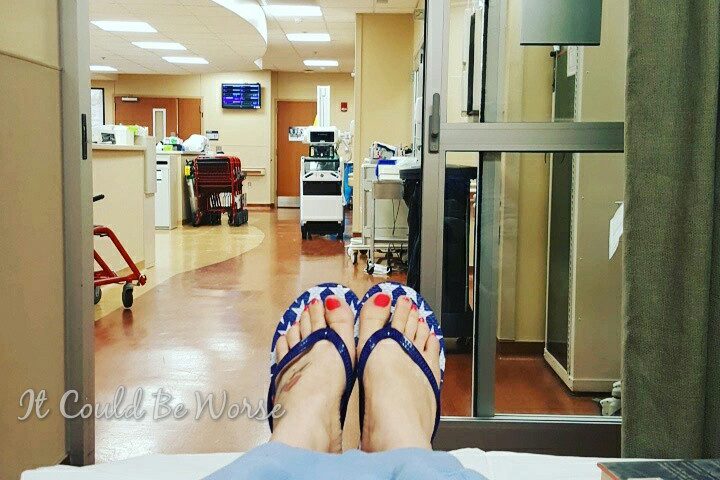
I went to an ER in Anaheim with a Crohns flare while on a business trip. I explained my symptoms and history to the ER nurses and then said I needed an NG tube, an IV to restore fluids and a shot of morphine for the pain. The nurses listened politely but did nothing. When the doctor arrived. He heard my story and told the nurses to insert an NG tube, start an IV with saline and prescribed a shot of morphine. I remained in the hospital for two nights until I was stable enough for discharge and able to fly back to NY (first class courtesy of my sympathetic manager).
Sometimes we do know better than nurses think we do. You knew what needed to happen and then the Dr backed you up. Sometimes we have to press and push for what we know needs to happen, medical degree or not. I hope you have found some Relief!
Mary and Mark, some basic knowledge when disparaging the staff who actually perform the interventions that relieve your symptoms would probably help your outlook. Nurses are not allowed to insert ANYTHING, much less give narcotic pain medicine like morphine, WITHOUT a doctors order. That is why they “listened patiently and did nothing” until the doctor gave an order. This is across the US, regardless of state or situation. Please be respectful of the staff who routinely work twelve hour shifts and exhaust themselves physically and mentally to care for you. As an ER nurse, I was googling crowns management in the emergency setting in an effort to understand and help my patients. Your comments show a lack of basic knowledge and understanding that you’re condemning others for.
Elise, while I understand where you are coming from, I don’t believe myself or Mark were speaking anything negative about nurses in general or disparaging anyone. It is not a lack of basic knowledge or understanding, I’m a phlebotomist and IV ‘tech’ myself. I know in my own experience, the nurses automatically hook you up to saline when admitted to the ER, so something is being inserted immediately. And I think most IBD patients know that the orders come from doctors, we’ve done the ER trip a few times, and our suggestions are to only help the nurses be quicker, not for drug seeking purposes. I’ve never ‘requested narcotics’ or anything for pain, ever, even when my Crohn’s is causing severe pain. I do, however, suggest scans or saline or anything else I know will help, because I know my disease better than these ‘exhausted’ nurses, you’d think they’d appreciate the help. To earn respect, respect must be given as well.
Yes, nurses work their butts off, no one denied that, but your 12 hour shifts are not comparable to a lifetime of CONSTANT problems with IBD. This disease is exhausting and to think that your voluntary job that you chose to pursue is more important or demanding than the exhaustion we go through 24/7 actually negates and disparages our disability? Our IBD was not wanted nor chosen, but rather something 100% out of our control. IBD is a daily, CONSTANT emotional, physical and mental battle. It affects you more than a job, let’s be real.
Yes, we suggest things that work for us but because not all IBD patients are the same, and in actuality, each disease is individual to each patient. Perhaps listening to the patients who know their bodies and their disease would also help to understand what we are going through and how to help us, ya know, with our own knowledge and understanding through years of disease management. There is no cure all for IBD patients and most have went to the ER more than they’d like, so even if we aren’t nurses or doctors, we still have more of an idea of what’s going on than most. I’ve even had to educate nurses and ER doctors about a few things, so I’d say I have a pretty good idea about what I need and what I will get when going to the ER as my last resort.
You cannot condemn us for our patient perspectives and you cannot condemn us because you disagree.
I am a ICU nurse and a Crohn’s patient. I have worked ER and other areas in the hospital. Crohn’s disease is not widely understood but from nursing perspective you have to meet a protocol in order for them to do anything without a doctors order. Otherwise it would be practicing medicine without a liscence. Do not blame nurses for what is or is not ordered. That have to act with constraints they given to practice. Not all ERs have the same protocols in place giving the nurses permission to do any intervention without an order. As a patient I have worked these exhausting 12 hours shifts up until the point I was so sick I could not work and ended up either admitted during the middle of my shift or taken to emergency surgery for a complication of the disease; this mostly happens because of the grey area of should I go to work or go to the ER. I have been in an active flare since 2010 and my bowel resection helped but it did not stop the progression of the disease and was told on my last c-scope I am facing another resection if things continue to progress within the next 3 years. When you are constantly in active disease the symptoms vary from day to day and could deteriorate very rapidly. You have to learn your body and what is normal for you. Your best resource is not always the ER; but having a good and consistent contact with your GI. The ER is to stabilize and treat and sometimes even with all the tests and your clinical symptoms do not always match the numbers. Understand the matrix runs healthcare now. If your numbers do not match criteria set you will not be admitted. But your GI will know you better than anyone so it is always best to let them fight for you when you are sick or progress to the point of hospitalization.
I went in for what I knew was a bad crohns flare and was told that it was a stomach bug when in fact I knew my body and something was wrong. The tried to send me home until I refused. Come to find out I had a small bowel obstruction and had to have surgery.
Oh no! I’m so glad you persisted! I think sometimes the staff forgets what they see on labs isn’t necessarily what we are feeling on the inside. Crohn’s is so difficult that I agree with being adamant when you know something isn’t ‘right’.
Hi Mary, I just wanted to say, thank you for sharing experience’s and the ever changing indifferences of chrones disease. I am 30yo and have been diagnosed with chrones disease since, 2014 and to be honest I am almost at giving up point. No one understands or see’s what I go through, apart from my partner. It’s strange in a way, we rely heavily on our practitioners to educate, explain and offer treatments however, very few people hear their Doctor say (I don’t know, your bloods are different & they don’t tell us anything, maybe you are having a flair/maybe your not)… would you honestly be confident in taking on board treatment options from someone that has confirmed they have no idea, oh and don’t rule out gastro doc’s with this one, I have heard similar things with many as they say, no two persons are the same and the treatments are minimal, we all start with a base line steroid. Umm not comforting and If stress is a contributed health factor with chrones (from the beginning it shouldn’t be this hard!) I do believe in years to come better treatments will be available but, for now, from my own research of study facts taken from the 800 odd patients who were placed on biologicals to treat chrones confirmed it was clearly evident out of so few people, major long term health issues would be another thing to have to treat in the future, the lists included but not restricted to, MS, lymphoma, brain disease, live failure, response alterations (meaning … if the bio’s injected are not successful, when you have your next flare, you are at risks of the disease attacks speeding up by 50%) … now ! Don’t you think it’s hard enough to treat without increasing the bad affects by half!
You are a warrior! You got this! Thank you for reading and reaching out! I’m sorry that you can relate but it is comforting finding someone who I understand. Hugs!
diagnosed Dec 2017. WTH is this horrible thing ? Between the pain , the insurance issues, the unknown and nobody really ” getting ” how horrific you feel all the time and the endless suggestions of oo you should try this special oil, or don’t eat that or should you really have that. Omg, I’m 45 yrs old and all I hear is oo your so young you shouldn’t feel as bad as you do. Well I’m hear to tell ya, I may not be as bad as some cronies I know and have seen stories of but define ” bad” when it interferes with your daily life , it’s bad regardless. I commend all the sufferers out there who have been at battle for so many yrs. Everyone is a hero for making thus far.
correction , Dec 2016